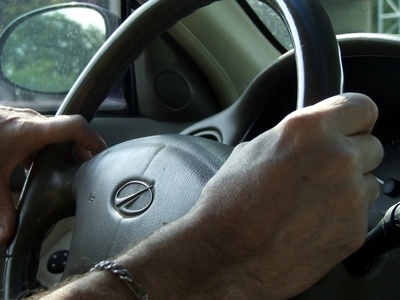
Your car's horn, so accessible on the steering wheel beneath your hands, looks and feels like an easy and effective way to communicate displeasure towards another driver or pedestrian. But its apparent convenience belies an undercurrent of little known legality. In truth, car horns were designed solely as a safety or warning device, and using them otherwise not only undermines their intended function, but might even be illegal.
Vehicular horns have been around for centuries, and came into being before the motorized automobile as we know it was even invented. The first recorded horn evidence dates back to the 1800s, when a German clockmaker installed one in an elaborate horseless carriage he'd invented. His horn was intended to draw attention to his majestic contraption, but as the vehicular horn evolved over the centuries, it transformed into a warning device. The horns of early autos took the form of everything from door-mounted squeeze-bulbs to small gongs within the car. As motorized vehicles increased in number, the honking of horns became so prevalent that laws were enacted to control noise pollution. Such laws continue to exist in most states today, though enforcement has proven to be spotty at best.
Most regional car horn-related legislation was passed in the 1950s, '60s and '70s to control noise pollution within city limits. The wording of such laws remains relatively unchanged to this day, and is similar in content from state to state, usually expounding the notion that it is illegal to use a car horn for any purpose other than to express warning. In the state of Washington, for instance, the law reads: "The driver of a motor vehicle shall when reasonably necessary to insure safe operation give audible warning with his horn but shall not otherwise use such horn when upon a highway."
Do you know anyone who has ever been busted for honking? Probably not. Horn-related laws are rarely enforced, especially in major cities where to start passing out tickets for horn-blowing could incite a major uprising. But that doesn't mean it's legal to honk out of turn, and that police officers don't have the authority to penalize you for doing so. In Washington, for example, the penalty for undue honking is a $124 ticket. In Harrisburg, Pennsylvania, the fine for excessive honking can be as high as $1000. In University City, Missouri, you might even receive a citation for honking someone else's horn. So the next time you think about leaning on that horn in response to an annoying driver, think again.